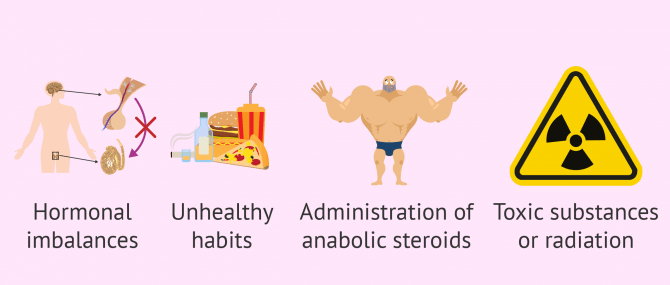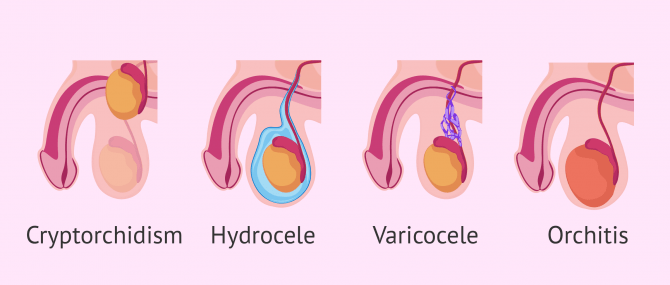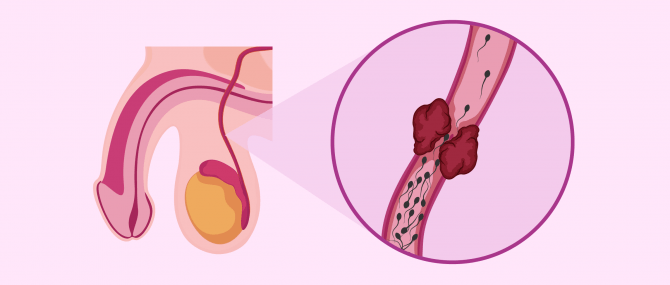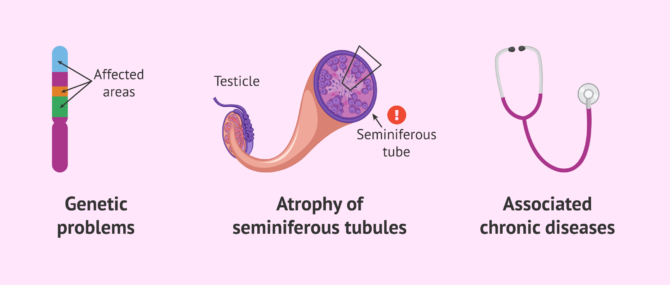Oligospermia or oligozoospermia is a sperm disorder whereby the man has a low sperm count in the ejaculate. In other words, oligospermia causes male infertility and diminishes the chances of natural pregnancy.
It can be due to various causes that affect the sperm count, affecting male fertility in these levels: pre-testicular, testicular, and post-testicular.
Provided below is an index with the 8 points we are going to expand on in this article.
- 1.
- 2.
- 3.
- 4.
- 5.
- 5.1.
- 5.2.
- 5.3.
- 5.4.
- 5.5.
- 5.6.
- 5.7.
- 6.
- 7.
- 8.
Pre-testicular causes
Related to sperm formation indirectly, as in these cases:
- Alterations in the hormones produced by the pituitary gland: prolactin, FSH and LH
- Administration of anabolic steroids
- Bad eating habits
- Unhealthy habits: drug, tobacco and alcohol use
- Stress
All these situations alter the proper functioning of the body and affect sperm production, amongst other side effects. Fortunately, a man affected by oligospermia can recover normozoospermia by establishing a healthier lifestyle.
In the particular case of athletes who take anabolic steroids, the testicular function can be recovered after quitting this therapy.
Testicular causes
This group of causes is associated with those alterations that affect the function of the testes when they carry out spermatogenesis. For this reason, when it is due to testicular causes, we refer to it as secretory oligospermia, as it does not affect the ejaculatory function, but the sperm production process.
What follows are the most common testicular causes that lead to oligozoospermia:
- Cryptorchidism
- One or both of the testes fail to descend into the scrotum. As a result, the undescended testicle is at a higher temperature than usual.
- Hydrocele
- Sac filled with fluid that forms around a testicle.
- Varicocele
- Enlargement of the veins within the spermatic cord (loose bag of skin that holds the testicles).
- Orchitis
- Inflammation of one or both testicles in men caused by an infection or virus.
- Trauma
- Male genital trauma.
- Genetic abnormalities
- Y chromosome microdeletion (YCM).
Some of these conditions can be treated with surgery, allowing the affected male to recover fertility again. Some examples of this are cryptorchidism, varicocele, and hydrocele.
A sign that oligospermia is due to testicular causes are too elevated FSH levels, since this hormone is in charge of stimulating the testicle to produce spermatozoa. Since this function is not carried out, FSH levels increase purposely to make the testicle respond to the stimulus.
Considering undergoing a fertility treatment? By getting your individual Fertility Report your will see different clinics especially selected for you out of the pool of clinics that meet our strict quality criteria. Moreover, it will offer you a comparison between the fees and conditions each clinic offers in order for you to make a well informed choice.
Post-testicular causes
Although sperm are synthesized in the testicles correctly, it is likely that there is some kind of blockage causing ejaculation to occur partially, which causes obstructive oligozoospermia.
A blockage may occur in the vasa deferentia, epididymis, or urethra, and can be caused by:
- Complications derived from surgery in the testes, especially if they cause some kind of cut
- Genetic abnormalities affecting the development of the male reproductive tract, such as bilateral cryptorchidism
- Diseases like mumps or meningitis before puberty
- Inflammation, cysts, or trauma
This type of oligospermia is the least severe of all three possible types, since there exists sperm production and the treatment is easy: it just requires finding a way to retrieve them. To this end, possible methods are surgery to fix it, or a testicular biopsy to undergo In Vitro Fertilization (IVF) to become a father.
Treatable or permanent oligospermia?
Permanent oligospermia occurs when it is due to:
- Genetic abnormalities: Y chromosome microdeletion, or abnormal karyotype.
- Seminiferous tubule atrophy, affecting the origin of sperm production
- Related chronic diseases
In these cases, one can recover sperm function after a few months as long as he follows an adequate treatment.
FAQs from users
Can seminal infections cause oligospermia?
Low sperm counts can be caused by a variety of health problems and medical treatments. These include urogenital infections that would cause a seminal infection, the most common cause of male infertility.
These include orchitis, epididymitis, prostatitis, vesiculitis, and urethritis. In the seminal sample, the presence of leukocytospermia and bacteriospermia can affect sperm concentration, motility and morphology.
The seminogram will reflect its presence due to the change in seminal characteristics by the establishment of microorganisms in the genital tract and their multiplication.
Spermatogenesis, maturation and transport of sperm through the seminal duct may be affected by infection. Not only the site of infection but also the type of microorganism causing the urogenital infection is important for diagnosis and treatment.
Does Klinefelter syndrome cause oligospermia?
Yes, in males with these genetic alteration, testicular development occurs at an slower growth rate than normal when they reach puberty. This causes an insufficient testosterone level and amount of sperm to be synthesized.
Can oligospermia occur after a vasectomy procedure?
Normally, after a vasectomy, the ultimate goal is to achieve a zero sperm count, that is, azoospermia. However, in some cases, vasectomy fails and sperm production continues, though partially. In the months following a vasectomy, it is normal for sperm to continue appearing in post-vasectomy semen analyses, as they are able to survive for a few months in the seminal ducts until their complete disappearance.
What causes severe oligozoospermia?
The most severe cases of oligospermia are those in which sperm production function is compromised, in particular, cases of permanent oligospermia, which has no cure. Normally, severe oligospermia is caused by genetic abnormalities, including Y chromosome microdeletion and testicular hypoplasia, among others.
Can eating habits affect a man's sperm count?
Absolutely yes. Diet and eating habits are key factors when it comes to determining sperm quality in males.
A number of studies have demonstrated that what you eat on a daily basis, especially if it contains high amounts of carbohydrates and saturated fats, can diminish the sperm count, causing oligozoospermia.
Can caffeine cause oligozoospermia?
Some scientific studies have associated high amounts of caffeine intake, such as coffee or coke, can lower the sperm count by 30%.
It is not that caffeine causes oligozoospermia directly, but better that is aggravates the problem especially in males with bad eating habits who drink alcohol, smoke, or take other kinds of drugs.
Does bike riding lead to low sperm count?
Some studies affirm that men who spend a lot of time on the bicycle may see their semen quality affected due both to tight clothing that increases the temperature of the testicles, and to the knocking of the genitals with the saddle.
The great effort that occurs in this type of endurance sports also contributes to the formation of reactive oxygen substances that affect male fertility.
Finally, high pressure on the nerves and blood vessels in the scrotal area can also contribute to impotence and erectile dysfunction in cyclists, so it is recommended to use alternative saddles that exercise less pressure on the groin and increase blood flow to the penis.
Suggested for you
There exist a different treatment option for each type of oligospermia, depending on the cause. To get more info on this, click here: Treatment of Oligospermia.
If you are interested in delving deeper into male infertility, its causes and potential treatment options, read: What Causes Male Infertility? – Symptoms, Treatment & Statistics.
Also, one should learn the difference between oligospermia and azoospermia, which is the total lack of sperm in the ejaculate. Get more info: Azoospermia – Can a Man Actually Have Zero Sperm Count?
We make a great effort to provide you with the highest quality information.
🙏 Please share this article if you liked it. 💜💜 You help us continue!
References
Eskenazi B, Wyrobek AJ, Sloter E, et al. The association of age and semen quality in healthy men. Hum.Reprod. 2003;18:447-454 (View)
Goncalves C, Cunha M, Rocha E, Fernandes S, Silva J, Ferraz L, Oliveira C, Barros A, Sousa M. Y-chromosome microdeletions in nonobstructive azoospermia and severe oligozoospermia. Asian J Androl. 2017;19(3):338-345 (View)
Kirby EW, Wiener LE, Rajanahally S, Crowell K, Coward RM. Undergoing varicocele repair before assisted reproduction improves pregnancy rate and live birth rate in azoospermic and oligospermic men with a varicocele: a systematic review and meta-analysis. Fertil Steril. 2016;106(6):1338-1343 (View)
McLachlan RI. Approach to the patient with oligozoospermia. J Clin Endocrinol Metab. 2013;98(3):873-80 (View)
Meistrich ML. Effects of chemotherapy and radiotherapy on spermatogenesis in humans. Fertil Steril. 2013;100(5):1180-6 (View)
Sermondade N, Faure C, Fezeu L, Lévy R, Czernichow S; Obesity-Fertility Collaborative Group. Obesity and increased risk for oligozoospermia and azoospermia. Arch Intern Med. 2012;172(5):440-442 (View)
FAQs from users: 'Can seminal infections cause oligospermia?', 'Does Klinefelter syndrome cause oligospermia?', 'Can oligospermia occur after a vasectomy procedure?', 'What causes severe oligozoospermia?', 'Can eating habits affect a man's sperm count?', 'Can caffeine cause oligozoospermia?' and 'Does bike riding lead to low sperm count?'.





